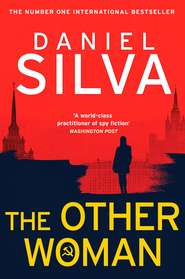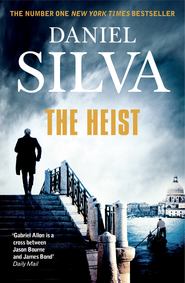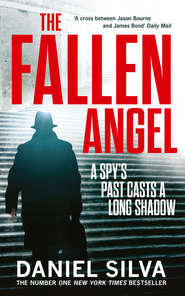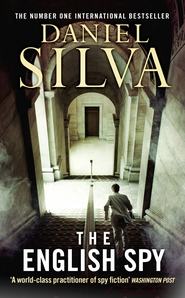По всем вопросам обращайтесь на: info@litportal.ru
(©) 2003-2024.
✖
Daniel Silva 2-Book Thriller Collection: Portrait of a Spy, The Fallen Angel
Настройки чтения
Размер шрифта
Высота строк
Поля
Chapter 26 Montmartre, Paris (#ulink_ef7f8e53-f5ef-50f8-ba51-5a8a86726910)
THE APARTMENT HOUSE STOOD ON the rue Lepic, not far from the cemetery. It was gray in color and seven floors in height, with wrought-iron balustrades and garret rooms across the top. A single leafless tree rose from the center courtyard and from the neat foyer spiraled a staircase with a well-worn runner that muffled Gabriel’s footfalls as he ascended swiftly to the third floor. The door to apartment 3A hung slightly ajar; in the sitting room was an elderly man dressed in pressed khaki trousers, a white oxford cloth shirt, and a leather bomber jacket with an unrepaired tear in the left shoulder. He had settled himself at the edge of a brocade-covered wing chair with his legs slightly splayed and his large hands bunched atop the crook of his olive wood cane, like a traveler on a rail platform resigned to a long wait. Between two yellowed fingers burned the stub of a filterless cigarette. Acrid smoke swirled above his head like a private storm cloud.
“You’re looking well,” said Ari Shamron. “Being back in the field obviously agrees with you.”
“It’s not exactly how I’d planned to spend the winter.”
“Then perhaps you shouldn’t have followed a suicide bomber into Covent Garden.”
Shamron gave a mirthless smile, then crushed out his cigarette in the ashtray on the coffee table. Six other stubs were already there, lined in a neat row, like bullets waiting to be loaded into a gun. He added the seventh and peered thoughtfully at Gabriel through the fog of smoke.
“It’s good to see you, my son. I thought our meeting in Cornwall last summer was going to be our last.”
“Actually, I was hoping it would be.”
“Can you at least pretend to have some regard for my feelings?”
“No.”
Shamron ignited another cigarette with his old Zippo lighter and purposely blew smoke in Gabriel’s direction.
“How eloquent,” said Gabriel.
“Words sometimes fail me. Fortunately, my enemies rarely do. And once again, they’ve managed to deliver you back into the arms of King Saul Boulevard, where you belong.”
“Temporarily.”
“Ah, yes,” Shamron agreed with disingenuous haste. “By all means, this arrangement is purely temporary.”
Gabriel went to the French doors overlooking the rue Lepic and opened one. A chill draft entered the room, bringing with it the sound of the evening traffic.
“Must you?” Shamron asked, frowning. “My doctor says I should avoid drafts.”
“Mine says I should avoid secondhand smoke. Thanks to you, I have the lungs of a man who smokes forty cigarettes a day.”
“At some point you’re going to have to stop blaming me for everything that’s gone wrong with your life.”
“Why?”
“Because it’s counterproductive.”
“It also happens to be the truth.”
“I’ve always found it best to avoid the truth. It invariably leads to unnecessary complications.”
Gabriel closed the door, muting the sound of the traffic, and asked Shamron why he had come to Paris.
“Uzi thought you could use some extra help on the ground.”
“Why didn’t he tell me you were coming?”
“It must have slipped his mind.”
“Does he even know you’re here?”
“No.”
Gabriel couldn’t help but smile. “Let’s try this one more time, Ari. Why are you in Paris?”
“I was worried.”
“About the operation?”
“About you,” Shamron said. “That’s what it means to be a father. We worry about our children until the day we die.”
“I’m afraid I wouldn’t know anything about that.”
“Forgive me, my son,” Shamron said after a moment. “I should have known better. After all, that’s my fault, too.”
He pushed himself upright and, leaning heavily on his cane, moved into the kitchen. The components of a coffee press lay scattered across the countertop, along with an empty teakettle and an open bag of Carte Noir. Shamron made a feeble attempt to light the gas stove before raising his hands in a gesture of surrender. Gabriel nudged him toward the small café-style table and lifted the bag of coffee cautiously to his nose. It smelled like dust.
“Unless I’m mistaken,” Shamron said, lowering himself into the chair, “it’s the same coffee we drank the last time we were here.”
“There’s a market next door. Do you think you can survive alone until I get back?”
With a dismissive wave of his hand, Shamron indicated the coffee was good enough. Gabriel filled the teakettle with water and placed it on the stove to boil.
“There’s still one thing I don’t understand,” Shamron said, watching him carefully.
“It’s really not that complicated, Ari. First you pour in the coffee, then you add the water, then you push the little plunger.”
“I was referring to Covent Garden. Why did you follow him? Why didn’t you simply warn Graham Seymour and go back to your cottage by the sea?”
Gabriel made no response.
“Will you allow me to offer a possible explanation?”
“If you insist.”
“You went after him because you knew full well the British had neither the courage nor the resolve to stop him on their own. Our European friends are in the midst of a full-blown existential crisis. I’m convinced it’s one of the reasons they despise us. We have a purpose. We believe our cause is just. They believe in nothing except their thirty-five-hour workweek, their global warming, and their annual six-week vacation in the south. What boggles the mind is why you choose to live among them.”
“Because once upon a time they actually believed in God, and their faith inspired them to paint like angels.”
“That’s true,” Shamron said. “But faith in God now resides almost exclusively in the jihadis. Unfortunately, it’s a faith that was born of Wahhabi intolerance and fed by Saudi money. After 9/11, the Saudis promised to put an end to the incitement that gave rise to Bin Laden and al-Qaeda. But now, just ten years later, Saudi money is once again fueling the hatred, with scarcely a word of protest from the Americans.”
“They’ve managed to convince themselves that the Saudis are an important ally in the fight against terrorism.”
“They’re delusional,” Shamron said. “But it’s not entirely their fault. Oil isn’t the only thing flowing from Saudi Arabia to the West. There’s also a great deal of intelligence in the pipeline. The Saudi GID is constantly tipping off the CIA and the European services about potential plots and suspicious individuals. Occasionally, the tips contain actionable intelligence, but most of it is complete and utter crap.”











